We fund research to improve treatment for people with GI and HPB cancers. All BRIGHT’s medical Trustees are involved in research studies
Identifying “Good Bacteria” in Pancreatic Cancer
Mr Nabeel Merali is a ST5 trainee in Liver and Pancreatic Surgery at the Royal Surrey NHS Trust and has started a PhD at the University of Surrey in October 2021 for 3 years looking into the influence of the microbiome (trillions of microbes including bacteria, fungi and viruses in our bodies) on Pancreatic Cancer. His research is funded by BRIGHT charity.
More than 10,000 people are diagnosed with Pancreatic Cancer each year in the UK and their prognosis is dismal. Bacteria present in the gastrointestinal-tract and within the tumour itself can influence the response of the immune system against the cancer and also the effectiveness of chemotherapy.
Nabeel’s project aims to find the “good bacteria” in the tumours and bile-fluid associated with longer patient survival. We will use these data to develop “biomarkers” able to diagnose and stratify the disease, and discover new mechanisms of the immune response that can be exploited to create better treatments, and ultimately improve patient outcomes and survival. For example, perhaps pro-biotics or anti-biotics could be used alongside standard chemotherapy to improve the anti-cancer treatment effect.

Dr Nabeel Merali
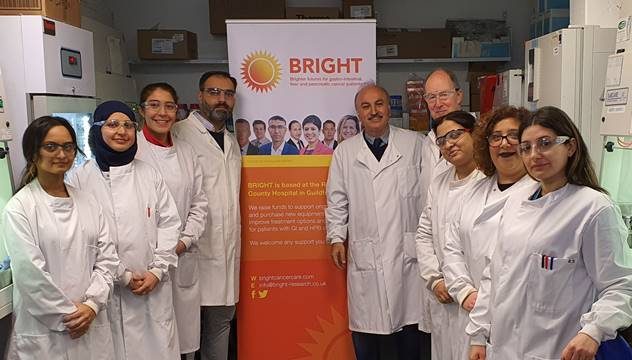 Professor Helmout Modjtahedi & Team, Kingston
Professor Helmout Modjtahedi & Team, Kingston
Targeting Cancer
Dr Sharadah Essapen, Consultant Clinical Oncologist and BRIGHT Trustee has been working with Professor Modjtahedi of Kingston University on a four-year research project exploring targeted treatments for colorectal cancer patients.
This project is investigating the use of biomarkers (a substance whose detection indicates a particular disease state) expressed on tumour cells, which could potentially lead to new anti-body based drugs targeted to the individual patient.
Identifying these biomarkers is important as it will help to prevent patients being given unnecessary treatment.
Evaluating Colorectal Cancer Treatments
Following the purchase of the Papillon Machine (which delivers targeted low energy x-rays to early stage rectal cancers), BRIGHT is now funding the collection of valuable data on patients treated by Papillon, as well as patients receiving other colorectal treatments.
The aim of funding this ongoing data collection is to assess the effectiveness of Papillon treatment on patient-centred outcomes, such as survival and quality of life. BRIGHT’s aim is for this database to be used by all Papillon centres around the world.
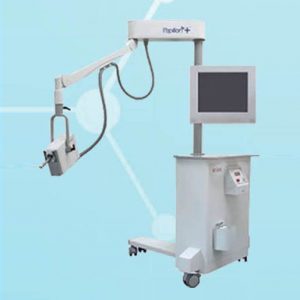
Evaluating HPB Cancer Treatments
The outcomes for pancreatic and liver cancer surgery are collected on two dedicated databases. The hope is that BRIGHT will support staff to enter patient data so that the outcomes in terms of survival can be understood and publicised. The table shows current outcome figures.
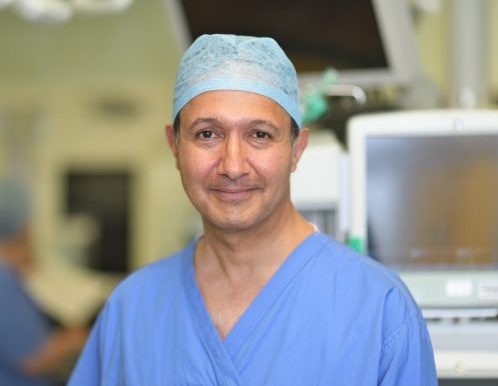
Professor Nariman Karanjia Consultant HPB Surgeon
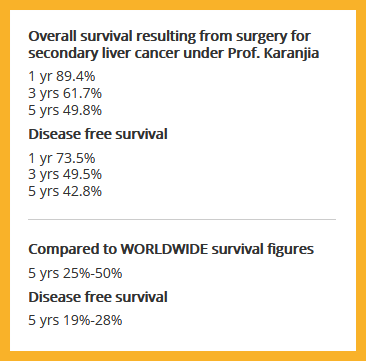
Clinical
Dr Tony Dhillon, BRIGHT Trustee, Senior Lecturer and Consultant Medical Oncologist at the RSCH has recently obtained external funding for his research programme. BRIGHT has been proud to fund Dr Dhillon’s research salary which has enabled him to develop world leading cancer trials. Dr Dhillon’s clinical trials investigate:
- Whether immunotherapy can improve the outcomes for bowel cancer patients
- Liver functioning following chemotherapy
- How responsive certain cancers are to particular drug treatments
The findings of these studies have the potential to change future treatments for colorectal cancer patients.

Dr Tony Dhillon Consultant Medical Oncologist
Vectra Polaris Machine
Following the purchase of a Vectra Polaris machine by the Prostate Project in 2019, BRIGHT funded a dedicated technician who will oversee and operate the equipment.
The Vectra Polaris is a new class of Automated Quantitative Pathology Imaging System that can easily detect and measure up to 9 overlapping biomarkers within a single tissue section. This state of the art technology will provide in-depth analysis of interactions between immune and cancerous cells that was previously impossible. It is vital to the development of cancer immunotherapy, a revolutionary new form of treatment which artificially stimulates the immune system to treat cancer and will help transform cancer care in the UK. In addition, the new machine will provide a valuable service to Royal Surrey County Hospital Pathology Unit.
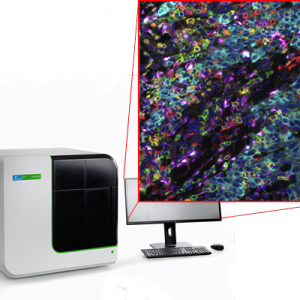
Eirini Martinou
I am carrying out my current PhD research under the supervision of Professor Karanjia and the Postgraduate Director Dr Lisiane Meira at University of Surrey. I am very grateful to BRIGHT for their contributions to funding my work.
My research is looking at whether certain genes called ‘HOX’ may be important in patients with colorectal liver metastases (colorectal cancer that has spread to the liver). HOX genes are genes responsible for organ development and several studies have shown that they play an important role in various types of cancers such as blood cancers and prostate cancers, however their role in colorectal cancer (especially when spread to the liver) has not been fully investigated to date.
I am exploring whether these HOX genes may play a role in colorectal cancer initiation and progression and therefore whether they may help in the development of more targeted treatment in the future. I am also looking at the relationship between these genes and overall survival, for example whether patients who over express these genes have worse survival outcomes in comparison with those who express these genes at a lesser extent.
I have produced preliminary results of my work and subsequently won the Thomas Vicary Prize at the Kent Surrey and Sussex surgical symposium (Thomas Vicary Prize); see more at https://www.ksssurgicalsymposium.com/
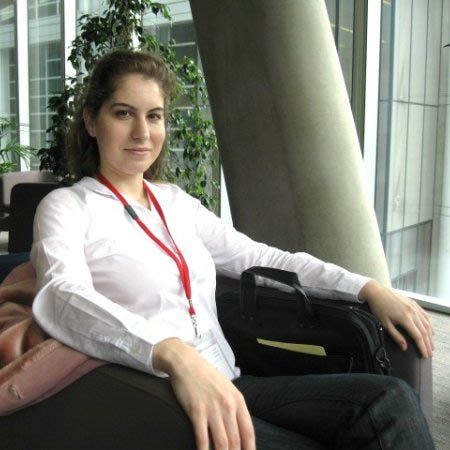 Eirini Martinou, PhD Research Student
Eirini Martinou, PhD Research Student
Publications
These are some of the research papers produced by the medical Trustees of BRIGHT
The human papillomavirus as a common pathogen in oropharyngeal, anal and cervical cancers. 2019 Download document (pdf)
Liver resection for colorectal cancer metastases involving the caudate. October 2011 Download abstract
Survival and recurrence after neo-adjuvant chemotherapy and liver resection for colorectal metastases: a ten year study. August 2008 Download document (pdf)
Randomized clinical trial on enhanced recovery versus standard care following open liver resection. July 2013 Download document (pdf)
‘Close shave’ in liver resection for colorectal liver metastases. January 2009 Download abstract

